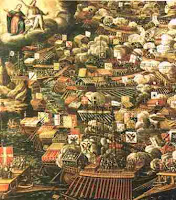Saint Therese of Lisieux first read the book when she was 14 years old and says,
Reading this was one of the greatest graces of my life. I read it at the window of my study, and the impression I received from it is too intimate and too sweet for me to express . . . All the great truths of religion, the mysteries of eternity, plunged my soul into a happiness not of the earth . . . I experienced already what God reserves for those who love Him (not with the eye of man, but with that of the heart), and seeing that the eternal rewards had no proportion to the light sacrifices of life, I wanted to love, to love Jesus with passion, to give Him a thousand proofs of love while I still could. I copied out several passages on perfect love, on the reception that the good God will give His elect at the moment when He Himself becomes their great and eternal reward, and I kept repeating unceasingly the words of love burning in my heart."
In a section on the Eucharist he describes how the priest on the altar, fills a representative function by assuming the person of Jesus Christ. I should note that as he wrote this in the 19th Century he is describing the priests actions in what is now called the Extraordinary Form of the Mass. In reading this it is obvious to note the loss of the sacred and mysterious when compared to the actions of the priest in today's Novus Ordo. Where the priest too often begins Mass more like a 'Master of Ceremonies.'
At Mass, we come out of the sacristy wearing on our shoulders that mysterious chasuble, the image of the Cross that our Lord Jesus Christ bore upon His own shoulders. The alb that covers us represents the white robe in which the Son of God was mocked at the court of Herod, but which His innocence transformed into a garment of dazzling brightness. We carry, hanging from our arms, that maniple of tears, intended to wipe away the sweat from our foreheads and restore us from our failings.
After bowing, we ascend the steps of the altar, as our Lord Jesus Christ climbed the steps of Golgotha. we raise our hands, when we say Oremus, as Jesus Christ prayed, with His hands raised toward His Father. At the Canon, we speak in a low voice, like Jesus Christ, who, in the Garden of Olives, moved a stone's throw away from His disciples, in order to enter into the silence of recollection and prayer. At the Elevation, we take the Host in our hands, just as Jesus Christ, at the Last Supper, took the bread and wine into His holy and venerable hands. Then our words cease, our personality disappears, and the voice of Jesus Christ replaces that of His minister. it is no longer we who speak, no longer we who live: the body of the priest has become the very body of God.


